
Jackie Coogan, on board of SS Leviathan in 1924. French postcard by A.N. in the Les Vedettes de Cinéma series, Paris, no. 88. Photo: Rol. On 4 November 1924, Jackie went back to the US on the SS Leviathan, after his European tour of September-October that year, visiting London, Paris, Rome, Athens, Budapest, Vienna, and Berlin. He had come with the same boat, wearing a cap from the boat during his tour.
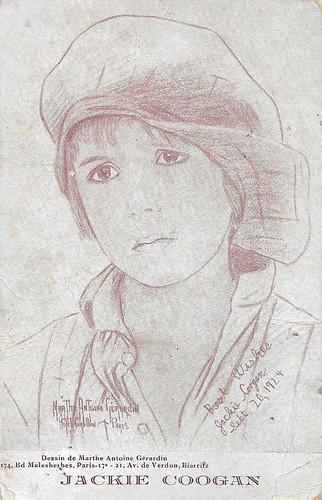
French postcard. Drawing of Jackie Coogan by Marthe Antoine Girardin, Paris. The inscription "Best wishes, Jackie Coogan, Sept. 20, 1924" refers to Coogan's European tour of that year. The cap worn sideways probably refers to Coogan's film Daddy (E. Mason Hopper, 1923).
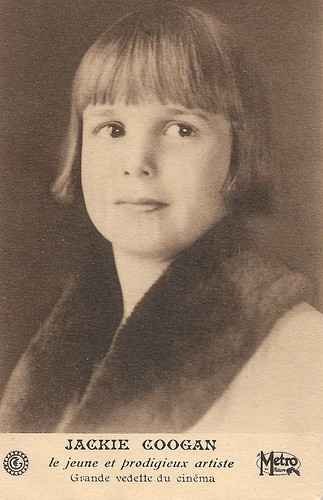
French postcard. Photo: Metro Pictures / Gaumont. The card refers to Coogan's visit to Geneva, during his 1924 European tour, and promotes his film Long Live the King (Victor Schertzinger, 1923) at the Colysée cinema. October 1924 Coogan celebrated his 10th birthday at Hotel Beau Rivage in Geneva.
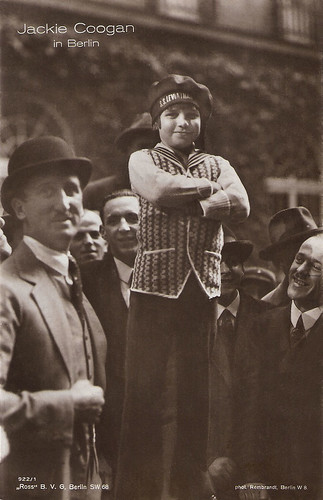
German postcard by Ross Verlag, Berlin, 922/1. Photo: Rembrandt, Berlin. The photo was taken in Berlin during Coogan's European tour in 1924. The man at the left is Coogan's father, John Henry Coogan Jr.
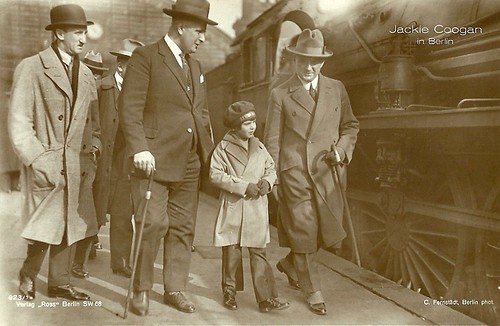
Jackie Coogan in Berlin. The man at the far left is Coogan's father. German postcard by Ross Verlag, Berlin, no. 923/1. Photo: C. Fernstädt, Berlin.
Using his status for a humanitarian cause
According to Wikipedia, Jackie Coogan toured across the United States and Europe in 1924 on a "Children's Crusade", working with Near East Relief (NER). The tour was part of his fundraising drive, which provided more than $1 million in clothing, food, and other contributions (worth more than $13 million in 2012 dollars), funds raised for Armenian and Greek Genocide Orphans.
In addition, the tour promoted Coogan's film A Boy of Flanders (Victor Schertzinger, 1924), which, oddly enough, takes place in the Netherlands and not in Belgium of which Flanders is a part. Coogan was also dressed up in a typical Volendamer (Dutch) folkloristic outfit. In The Netherlands, the film was therefore rebaptised 'Een Hollandsche jongen' (A Dutch Boy).
According to the newspapers, September 1924 Coogan docked in Southampton with the SS Leviathan and then visited London, Paris, Rome, and Athens. Coogan was accompanied by his father Jack, his tutor Mrs. Kora Newell, and his manager and future stepfather, Arthur Bernstein. His mother stayed home, as she was expecting her second son. After ten days of holidays early October in Semmering (Austria), the trip continued to Budapest, Vienna, and Berlin. Attempts to have him visit Amsterdam as well failed.
After a return to Paris, he took the ship back to the US on 4 November, as he had to work on the film sets again. Huge crowds attended Coogan's visits, reaching its climax in October 1924 in Athens, according to his biographer Diana Serra Cary, when he handed over the bills of lading for the relief cargo in presence of Greek and American dignitaries and some 7000 orphans in the care of Near East Relief. Coogan was awarded with the Silver Cross of the Order of St. George. Way before TV or internet, the media coverage of the tour in printed press, film magazines and newsreels was huge. The Ross Verlag postcards on Coogan's Berlin visit are clearly part of this.
Coogan was honored by officials in the United States, Greece, and Rome, where he had an audience with Pope Pius XI. He also had a 15-minute meeting with Benito Mussolini, who gave him an autographed photo inscribed "Al Piccolo Grande" (To the Little Great One). There were demonstrations against his visit to Vienna in October 1924 because some people on the far right believed he was Jewish. He was in fact of Irish Catholic descent.
Coogan may well have been the first star using his status for a humanitarian cause. After a return to Paris, Jackie Coogan and his father took the ship back to the US on 4 November, as he had to work from 28 October on the film sets again.
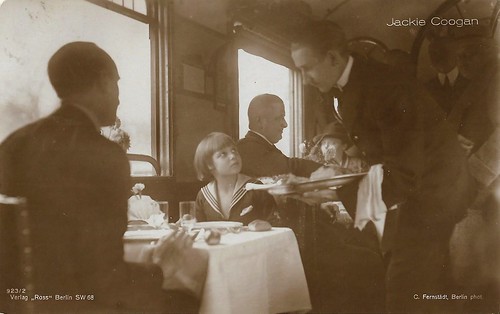
Jackie Coogan and his father travelling to Berlin. German postcard by Ross Verlag, Berlin, no. 923/2. Photo: C. Fernstädt, Berlin.
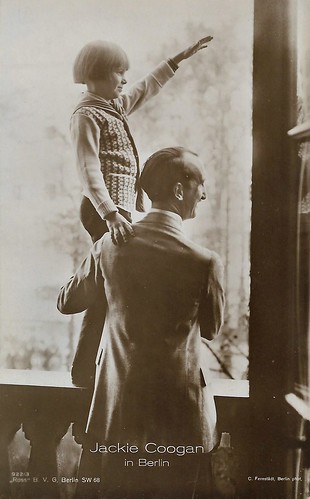
Held by his father, Jackie Coogan waves to his fans from the balcony of the Hotel Adlon in Berlin, October 1924. German postcard by Ross Verlag, Berlin, no. 923/3. Photo: C. Fernstädt, Berlin.
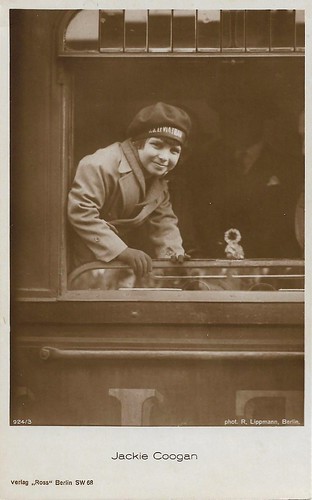
Part of the 1924 charity tour of Jackie Coogan through Europe. German postcard by Ross Verlag, Berlin, no. 924/3. Photo: C. Fernstädt, Berlin.
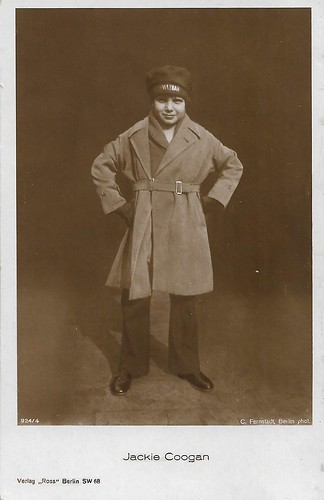
Part of the 1924 charity tour of Jackie Coogan through Europe. Mark the cap from the ocean liner Leviathan with which he traveled to and from Europe. German postcard by Ross Verlag, Berlin, no. 924/4. Photo: C. Fernstädt, Berlin.

German postcard by Ross Verlag, no. 680/1, 1919-1924. Photo: Bafag / MGM. Jackie Coogan in A Boy of Flanders (Victor Schertzinger, 1924), based on the novel by Ouida. The girl is Jeanne "Jean" Carpenter, who plays Alios Cogez, while the woman may be Nell Craig, who plays her mother, Marie Cogez.
Sources: : Pinkylovejoy, Diana Serra Cary (Jackie Coogan: The World's Boy King: A Biography of Hollywood's Legendary Child Star), Wikipedia and IMDb.
2 comments:
Another wonderful post. Coogan ended up in the role of Uncle Foster on the television sitcom THE ADDAMS FAMILY in his later years---and that is how most people in my generation will always remember him. To look at him here in these postcards, and to know that his fortune was squandered by his family---always leaves me a little sad however.
Thank you, Maria. I will make a post soon on three of his films, including Oliver Twist (1922). The postcards are just great. Greetings from Amsterdam!
Post a Comment